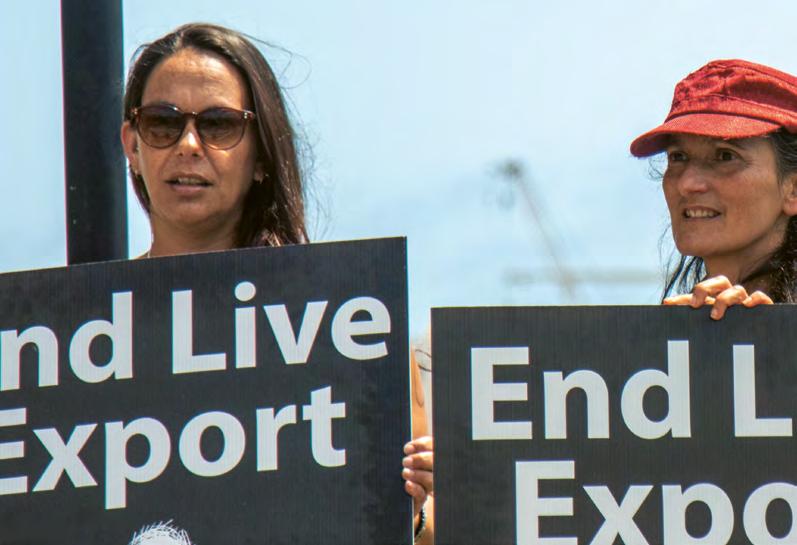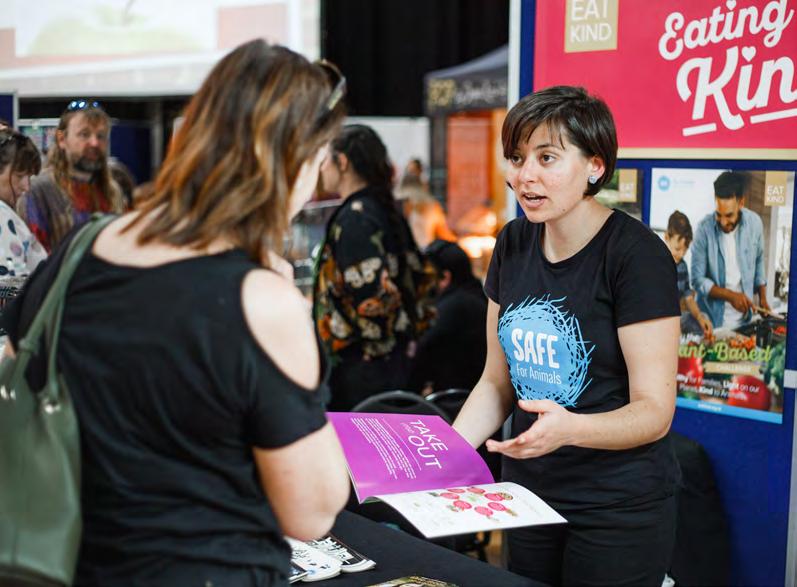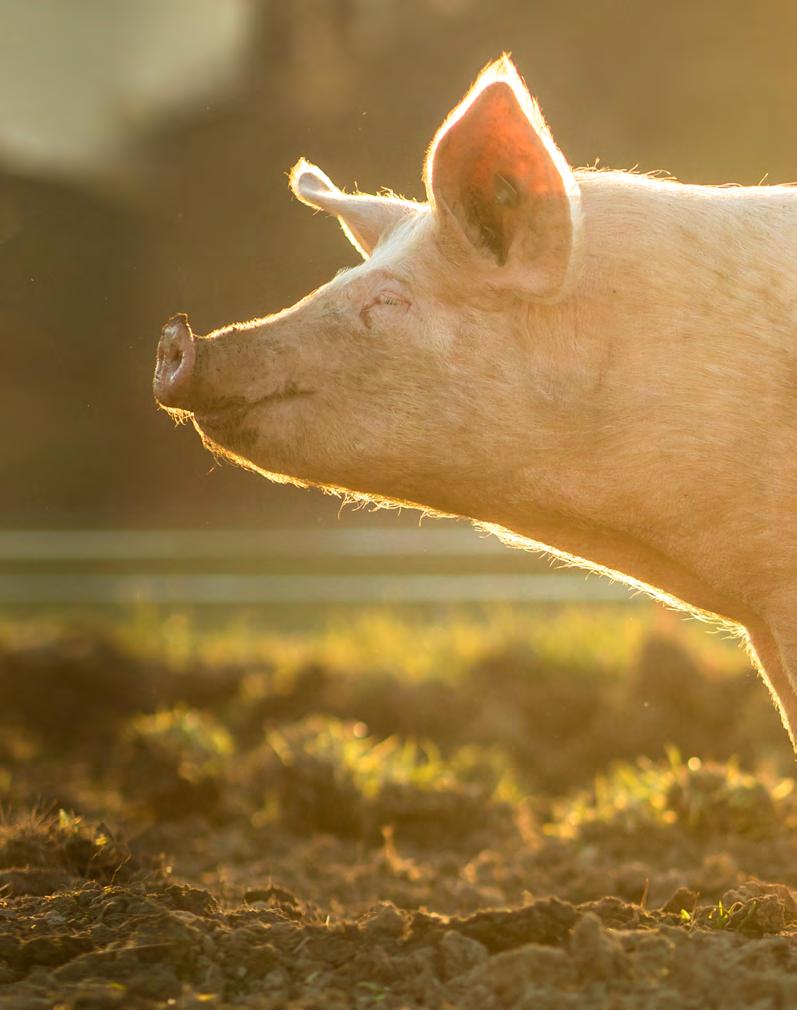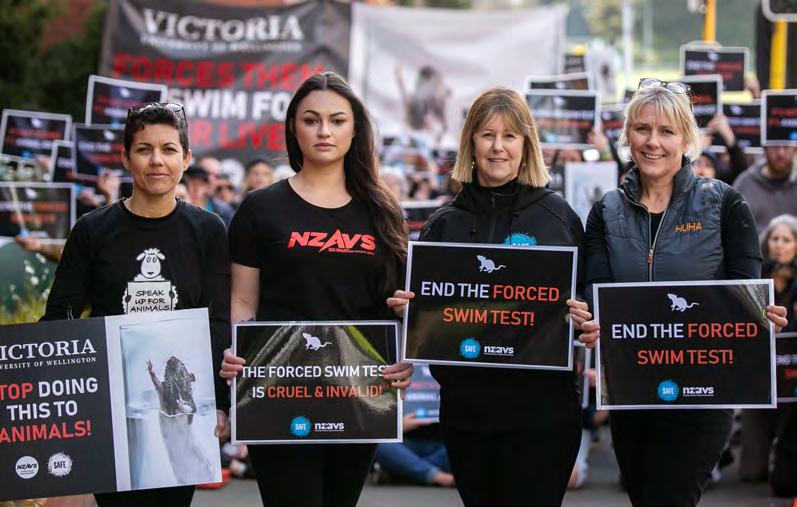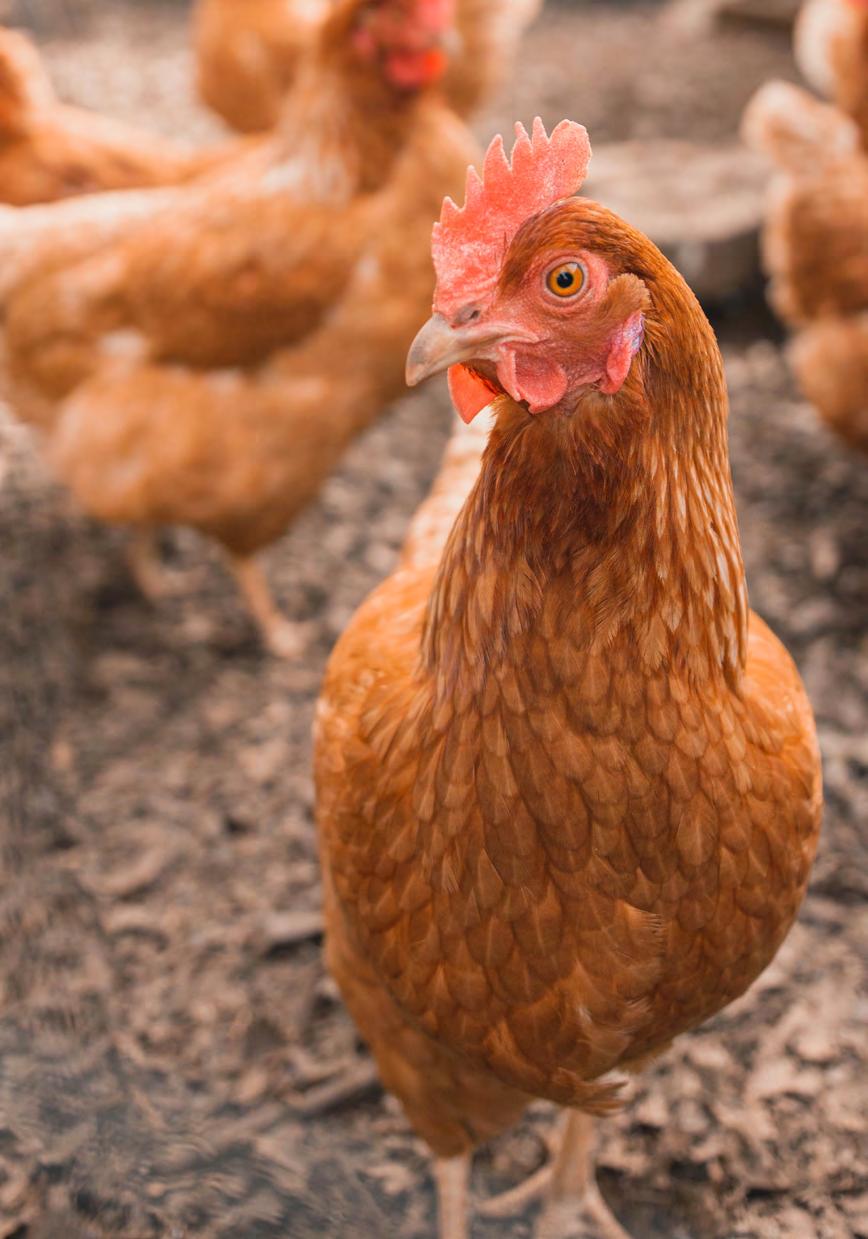
8 minute read
Colony cages
Justice for animals Colony cages
We are single-minded in our determination to free hens from cruel cages, and that tireless effort is paying off, as we are achieving extraordinary change in New Zealand. In the past fiscal year, 24 new cage-free policies have been announced by compassionate companies across the country.
After negotiations with SAFE, Bidfood New Zealand, the country’s leading wholesale foodservice and distribution company, released a 2024 cage-free policy. With over 15,000 customers nationwide, Bidfood is the largest supplier of eggs to the food industry and the second largest national supplier of eggs after supermarkets. It’s cage-free commitment epitomises how rapidly New Zealand’s egg industry is changing and responding to people making animal welfare a priority when they shop. Bidfood’s announcement adds yet another voice to a growing chorus of companies saying no to cage cruelty.
Prior to Bidfood’s announcement, SAFE had joined forces with over 58 organisations in a campaign against the world’s largest hotel company, Marriott International. After 48 hours, a cage-free policy was produced by the hotel chain. Following this, SAFE received cage-free commitments from over 25 hotels around the country. Honourable mentions include The Rees, Brook Serene Hotels and Cordis. We have also secured another cage-free victory from Service Foods New Zealand. Service Foods is the country’s second-leading wholesale foodservice and distribution company. It announced the good news just months after it’s biggest competitor, Bidfood NZ, had released it’s cage-free policy after dialogue with SAFE.
SAFE is also delighted to have secured a 2020 cage-free commitment from Starbucks New Zealand. This pledge makes New Zealand the first country in the world to have all its license-operated Starbucks cafés pledge to go cage-free.
More recently, SAFE has received several cage-free victories, one of the more significant being from Original Foods Baking Co. (Original Foods). This company is one of New Zealand’s most established wholesale bakeries and supplies baked goods to hundreds of businesses across the country. We were also pleased to have secured cage-free commitments from international brands Nando’s
New Zealand has lost its appetite for caged eggs. We're seeing more cage-free commitments from both national and international businesses.

and Denny’s, which up until this year, had refused to extend their overseas cage-free commitments to New Zealand.
New Zealand owned hotel businesses, Williams Hotel Group, Left Bank Hotel and Bolton Hotel, also joined the growing list of cage-free hotels in New Zealand. In other exciting news, SAFE secured a cage-free commitment from food manufacturer The Casual Foodie, which produce over 5,000 ready-to-eat meals every week.
It is evident that a new standard has been set within the New Zealand foodservice sector, and SAFE looks forward to securing more commitments within the industry. SAFE’s corporate campaigns team is working every day to secure even more cage-free commitments from both national and international businesses.

Open Wing Alliance
This past year SAFE joined the Open Wing Alliance, a coalition of 46 organisations dedicated to freeing hens from cages, in a global campaign. Together, we asked global hotel companies Wyndham Destinations and Wyndham Hotels & Resorts to go cage-free. After a short campaign, both major hotel companies released global cage-free egg commitments. This fantastic win means future generations of hens around the world will be free from a lifetime inside cages.
In May, two members from SAFE’s campaigns team were thrilled to attend the Open Wing Alliance annual Global Summit in Warsaw, Poland, with the aid of a grant from them. SAFE joined representatives from 46 animal protection organisations from 40 countries for the fourday conference. The summit was an excellent opportunity for attendees to learn new and innovative campaign techniques, discuss the importance of corporate campaigning and form invaluable relationships with other likeminded organisations.
During the conference, all 46 organisations joined together under the Open Wing Alliance banner in launching a global cage-free campaign against Hilton Hotel Group and Best Western Hotels. Hilton set a new record by producing a global cage-free policy within 24 hours of the campaign kick-off. Hilton’s action was followed by Best Western, which also produced a strong cage-free egg policy just last week. These massive wins prove just how much can be achieved when we work together as a collective to free hens from cruel cages!
Cage-free directory
In August, SAFE launched New Zealand’s first-ever Cage-Free Egg Directory. This lists companies operating across the country and features their current cagefree status. The directory is a powerful tool for caring Kiwis concerned about where their food comes from and will also help people make purchasing choices that align with their values.
Many of the businesses on our cage-free list chose to ditch cage eggs after private negotiations with SAFE. Others on the list are companies that have pledged to go cage-free thanks to the help and generosity of SAFE supporters.
A guide for business
With so much interest in going cage-free amongst businesses in Aotearoa, we put together a guide to help progressive companies that are looking to remove caged-egg products from their supply chains.
1 billion
eggs
are produced annually in New Zealand every year. ½ of these are purchase by supermarkets. All of the country’s major supermarkets will be cage-free by 2027.
A 2020 poll exploring New Zealanders’ attitudes towards colony cages showed 76% of Kiwis oppose colony cages.
Battery cages account for
44.7%
of egg production in New Zealand and will become illegal in 2022.
Farmers will likely switch to cage-free farming methods to meet the nation’s demand for cage-free eggs.
4
GOING CAGE-FREE
Why are businesses choosing to go cage-free?
Kiwis care about hens and we are seeing more and more businesses respond by making kinder egg purchasing choices.
Foodservice and hospitality companies around the world are adding cage-free egg policies to their corporate social responsibility profiles. All of New Zealand’s major supermarkets have committed to removing cage eggs from their shelves Free-range farming by 2027. Popular restaurant chains, café outlets and manufacturing brands are also positioning themselves as cage-free.
Cage-free policies such as these are creating positive waves of change throughout the New Zealand egg industry. With so many businesses switching to cage-free options, egg producers are faced with the reality that New Zealanders have high expectations when it comes to animal welfare. Colony and battery cages breach New Zealand’s Animal Welfare Act 1999 as they do not allow hens to express their normal behaviours.
Pledging to purchase only cage-free egg products improves the lives of future generations of hens, who will be free from a lifetime of confinement in cages because of ethical businesses like yours.
A list of cage-free businesses can be found on SAFE’s website.
A cage-free policy shows your clients that your business supports and promotes the use of higher animal welfare products and values high-quality, sustainable ingredients. Three out of four Kiwis are opposed to the caging of hens. A cage-free policy will likely reflect your employees’ personal values and strengthen your brand’s public image. Such a policy will also distinguish your business from competitors. Free-range hens are housed in large sheds and are allowed access to the outdoors for a period of time each day. Free-range hens can, in theory, forage, dust bathe and roam within a restricted area, however studies show many hens in these systems are unable to gain access to the outdoors due to the high volume of birds, which preventing access to the exits.
High flock numbers
Hens recognise other individual 3 out of 4 New Zealanders hens and naturally maintain a pecking order within a flock. Hens raised in commercial systems live do not support among unnaturally large numbers of the caging of hens. other hens, making it impossible for the hens to form a normal social structure. This results in hens living in a continuous state of stress, GOING CAGE-FREE trying to establish their place in a 5 hierarchy, but never achieving it.
Quick facts
www.ultimateegg.co.nz/free-range-egg
Common misconceptions and frequently asked questions
I’m concerned about the extra cost of cage-free egg ingredients

Going Cage-Free A Guide for Businesses
This is a common concern put forward by companies wanting to move forward with a cage-free commitment. As of November 2019, over 44% of eggs produced annually in New Zealand were from battery cage farms. With the 2022 ban on battery cages approaching, New Zealand will see an increase in cage-free egg availability in the near future, which will lead to more competitive prices. A cost sheet provided to SAFE by an Auckland foodservice group reveals the price difference between cage eggs and free-range eggs. Initially this seems large when looking at the overall cost, however the price difference per egg works out to be very reasonable at only a 11 cent price increase per free-range egg in comparison to a cage egg.
EGG TYPE
Free range eggs
Cage eggs
PRICE PER 15 DOZEN (6 TRAYS)
$59.50
$40.80
PRICE PER EGG
$0.33
$0.22
Wholesale cost difference calculated from a foodservice group located in Auckland (1 November 2019)
Our customers won’t like it if we raise the price of our products to cover the extra cost of cage-free eggs
The cost difference between cage egg and free-range egg products is not large. Kiwis care about animal welfare and are highly supportive of brands that use higher welfare ingredients in their food products. We don’t use that many eggs
All the more reason to go cage-free. A cage-free policy from your business sets an important animal welfare standard for competitors, customers and the egg farming industry. No matter how many eggs your business uses, you can play an important role in setting this standard.


